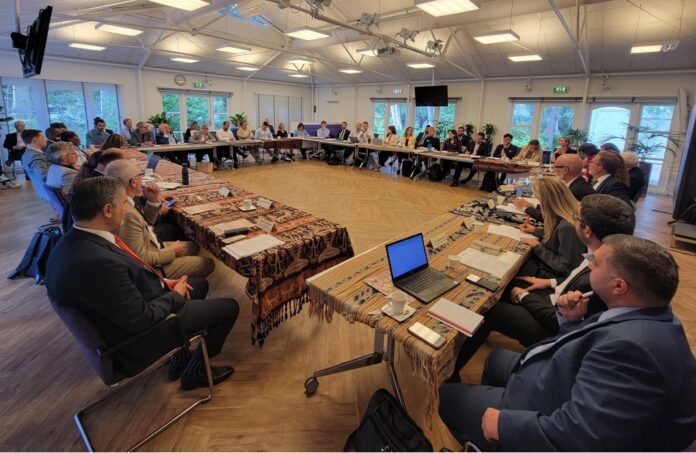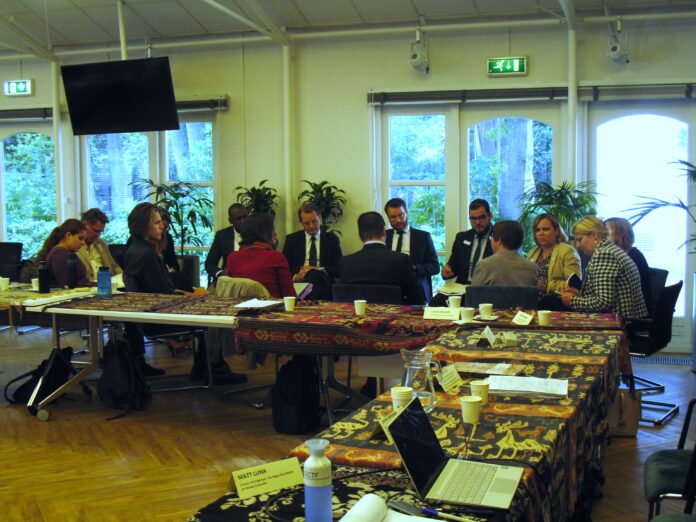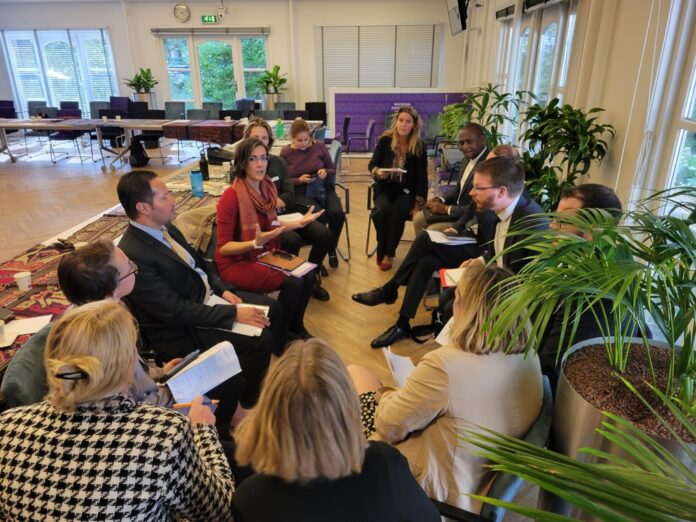On September 12, 2023, the world learned about the deadly consequences of Storm Daniel in Libya. Concluding a particularly destructive summer of natural disasters around the globe, this event rung the alarm as loudly as ever for the climate emergency we are facing.
On the same day, The Hague Roundtable on Climate and Security was assembled for the 14th time, dealing with the very questions raised by this dramatic event. The Roundtable, started in 2015 by climate-water communication advisor Matt Luna, discussed the impact of climate change on the military, conflicts and humanitarian crises. As in previous meetings, the Roundtable gathered experts, diplomats, NGO, and institutional representatives to transfer experiences and generate inputs for policymakers and civil society. Around 60 participants represented 40 embassies and organizations in the meeting.
By Diplomat Magazine, September 24, 2023
This edition of the Roundtable was organised with the Canadian Embassy in The Hague, in partnership with the NATO headquarters. Numerous embassies and missions were represented, along with the Dutch Ministry of Foreign Affairs and the United Nations. The discussions were focused on water scarcity, knowledge transfer, inclusivity and the opening of NATO’s Climate Change and Security Centre of Excellence (CCASCOE) in Montréal, Canada. Panellists from different organisations showcased their assessments and approaches in different areas of climate and security action. The participants were then separated in breakout groups on the themes of water scarcity, gender and climate, humanitarian crisis response and inputs for the CCASCOE. Given the high level of participation, the sessions were very interactive, allowing the table to ask questions and give inputs for each panel and to build conclusions collectively.

The first presentation by NATO policy officer Jordan Koop established the main impacts of climate change on a military institution, demonstrating how such a non-traditional actor needs to step up its involvement in climate action. Climate change is indeed expected to increase military activity, not only to contribute to disaster relief efforts, but also to face the security threats arising from resource scarcity and humanitarian crises. The risk of conflict extends to the geopolitical level as well as new fossil fuel exploitation opportunities will open up in the melting Arctic, creating a new area of competition.
While being a future relief actor, the military sector is also itself subject to the impacts of climate change, bound to affect equipment safety and operating conditions. In parallel, the question of the responsibility of the military in the environmental crisis arose, as it produces of 5.5% of global carbon emissions. While the role of NATO was shown to be crucial in initiating a green transition in the military, it remains a major challenge since this sector’s main priority is to increase its capacity.

The spotlight was then given to civil society actors Mahdi Ahmad and Amar Ibrahim, from the Bahr Aluloom Foundation in Iraq. This platform deals with the current water crisis in Iraq, on the verge of becoming water stressed. This specific case is a perfect example of a social crisis caused by climate change that increases the risk of conflict. The severe draught that Iraq has been facing has had a considerable impact on the livelihoods of farmers in the once ecologically rich marshlands.
The water sources drying out cause a rural exodus that leads to competition and clashes with the urban working population and catalyse social tensions. The gender aspect of this crisis was brought up as well, as women were left behind in the farms in precarity, living off of livestock. This shows that climate-induced crises do not impact men and women equally. As marginalised groups will be more impacted by their consequences, an inclusive approach to crisis relief is needed.

The last presentation by Laura Birkman from the Hague Centre for Strategic Studies, exposed methods for water conflict risk assessment and peacebuilding. By analysing possible conflict pathways, she showed how conflict risks can be predicted for better preventive action. The combination of water expertise and peacebuilding knowledge can be used to create cooperation in areas of resource competition prone to tensions. The need to identify the root causes of conflicts was also expressed. Though the case study of Iraq, it was shown that the problem of resource scarcity intersects with pre-existing socio-political conditions, as the country’s economy and institutions have been fragilized by years of war.
The panellists converged on many points in their assessment of the situation, which translated into similar priorities for action. The important takeaway that climate impacts intersect with socio-economic inequality, whether by gender, class, or geographical region, led all actors to promote inclusive solutions to climate and conflict risks. As a result, the Roundtable’s main keyword, that is cooperation, was evoked at the international and regional level and between the military, civil and academic sectors. Regarding this, knowledge production and transfer were the first step of all the intervention frameworks proposed in the panels.

This convergence of thoughts materialised in the last stage of the Roundtable, where all the contributors formed groups to summarise and add propositions on the aforementioned four themes. Many additional inputs were given in the very newly explored axis of gender, climate, and security. In this context, climate impacts reinforce preexisting inequalities, and require a major cultural shift to lead to inclusive solutions.
This raises the question of representation in leadership, which should be examined in institutions such as the CCASCOE. Other inputs were the focus on technology in water management and geoengineering, while still promoting demand-side resource management to avoid waste; the need to improve communication between actors to reduce redundant efforts and finally the one essential requirement for any climate action: funding.

Concluding on the topic of the Centre of Excellence was an opportunity for the participants to remember that solutions exist and are being implemented to address issues around climate and security. More than an alarmist exchange, this Roundtable was also a platform to share and appreciate all the efforts that have been made by all the actors to study, inform and act upon these issues.
The cooperation and knowledge transfer promoted by all the actors are exactly what the Roundtable has achieved, and such discussions are crucial to make progress in addressing the climate crisis.

Source: Diplomat Magazine, September 24, 2023






